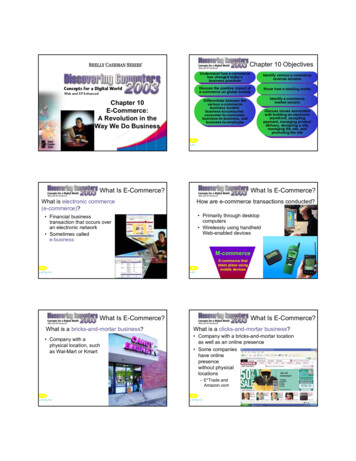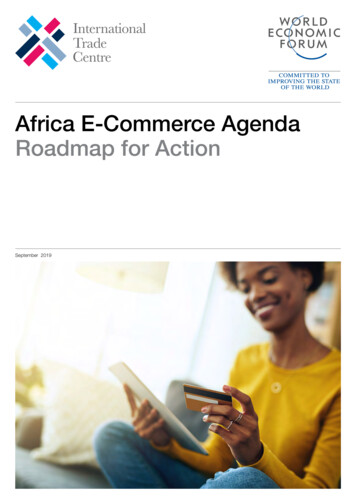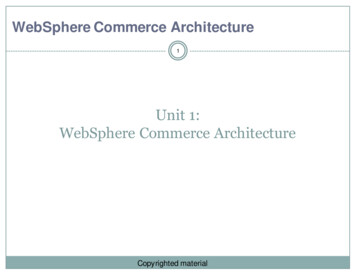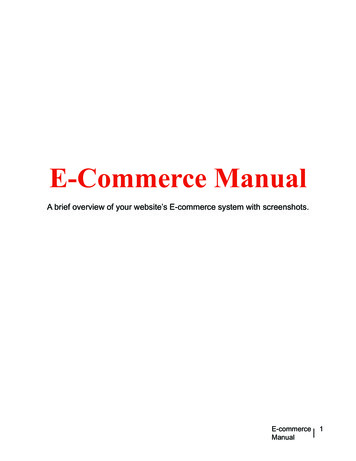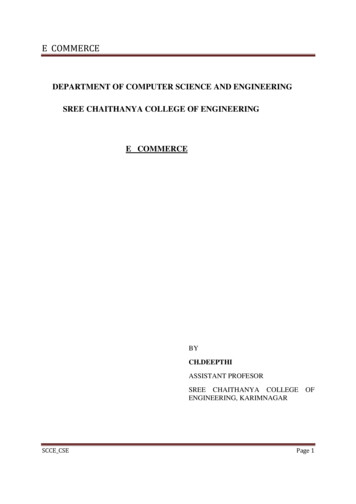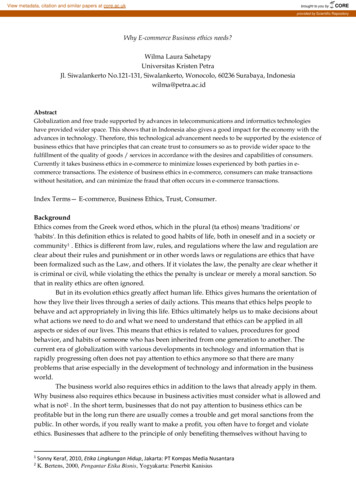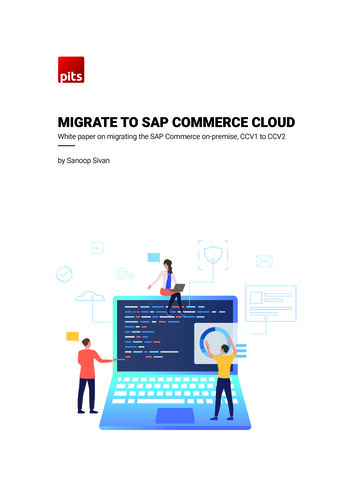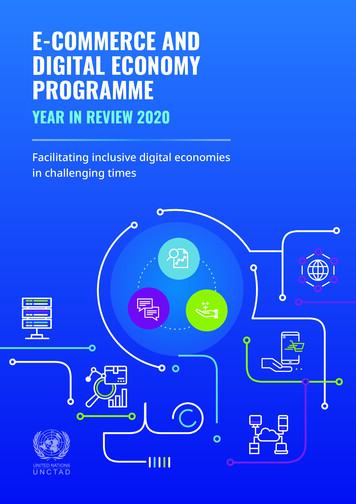
Transcription
E-COMMERCE ANDDIGITAL ECONOMYPROGRAMMEYEAR IN REVIEW 2020Facilitating inclusive digital economiesin challenging times1
2021, United Nations Conference on Trade and DevelopmentThe designations employed and the presentation of material on any mapin this work do not imply the expression of any opinion whatsoever on thepart of the United Nations concerning the legal status of any country, territory, city or area or of its authorities, or concerning the delimitation of itsfrontiers or boundaries.Mention of any firm or licensed process does not implythe endorsement of the United Nations.This publication has not been formally edited.UNCTAD/DTL/STICT/INF/2021/22
ContentList of Abbreviations and AcronymsList of Figures, Tables and Boxes1. Introduction2. Highlights from 20203. Contributing to the SDGs4. Main activities and accomplishments in 202045101416184.1 Building knowledge on how to benefit from e-commerce and the digital economy18Implications of COVID-19 for e-commerce and development18The Digital Economy Report19Technical Notes on ICT for Development and Policy Briefs20Other research activities22Database on statistics related to e-commerce and the digital economy224.2 Building capacity to harness the digital economy23E-commerce and Law Reform23eTrade Readiness Assessments28Development of National E-commerce Strategies35Technical assistance on measuring e-commerce and the digital economy38eTrade for Women384.3 Building consensus, fostering dialogue47Intergovernmental Group of Experts on E-commerce and the Digital Economy47Working Group on Measuring E-commerce and the Digital Economy48The future is digital but needs to be more inclusive: leveraging eTrade for all48E-commerce Weeks52Digital Cooperation for Development525. Goals and objectives for 2021 and beyond6. Management54566.1 Human resources566.2 Financial information576.3 Risk analysis596.4 Lessons learned607. AnnexesNotes62703
List of Abbreviations and AcronymsASEANAssociation of Southeast Asian NationsB2CBusiness to consumerDERDigital Economy ReportEACEast African CommunityECDEE-commerce and Digital EconomyECOWASEconomic Community of West African StatesECSE-commerce strategyEIFEnhanced Integrated FrameworkGIZDeutsche Gesellschaft für Internationale ZusammenarbeitICTInformation and Communication TechnologyIGEIntergovernmental Group of Experts on E-commerce and the Digital EconomyILOInternational Labour OrganizationITCInternational Trade CentreITFCInternational Islamic Trade Finance CorporationJSIJoint Statement InitiativeLDCsLeast Developed CountriesM&EMonitoring & EvaluationPDEPPacific Digital Economy ProgrammePIFSPacific Islands Forum SecretariatRCOResident Coordinator OfficeRPTCRegular Programme of Technical CooperationSDGsSustainable Development GoalsSIDSSmall Island Developing StatesSMEsSmall and medium-sized enterprisesUNUnited NationsUNCDFUnited Nations Capital Development FundUNCITRALUnited Nations Commission on International Trade LawUNCTADUnited Nations Conference on Trade and DevelopmentUNDPUnited Nations Development ProgrammeUNECAUnited Nations Economic Commission for AfricaUNECEUnited Nations Economic Commission for EuropeUNECLACUnited Nations Economic Commission for Latin America and the CaribbeanUNESCAPUnited Nations Economic and Social Commission for Asia and the PacificUNESCWAUnited Nations Economic and Social Commission for Western AfricaUNGISUN Group on the Information SocietyUPUUniversal Postal UnionWAEMUWest African Economic and Monetary UnionWSISWorld Summit on the Information Society Forum4
List of Figures, Tables and BoxesFigure 1. E-commerce and Digital Economy Programme’s Results Framework12Figure 2. B2C E-commerce index, average values by country group, 2019 vs. 202021Figure 3. Cyberlaw adoption rates in developing and least developed countries, 2018 vs. 202024Figure 4. UNCTAD’s eTrade Readiness Assessment status, as of December 202029Figure 5. Overall implementation rate of eT Ready recommendations by country32Figure 6. Number of implemented recommendations by country and policy area33Figure 7. UNCTAD’s E-Commerce Strategy status, as of December 202035Figure 8. Share of Aid for Trade resources for the ICT sector, 2015-201951Figure 9. ECDE Programme team organigram, April 202156Figure 10. ECDE Programme donors, 202057Figure 11. ECDE Programme expenditures by type, 202058Table 1. eTrade for all’s 7 key policy areas and partners as of December 202049Table 2. ECDE Programme expenditures by programme component and type, 202058Box 1. Examples of actions taken to implement recommendations related to legal and regulatory25frameworks31Box 2. Growing partner support for the implementation of eT Readies’ recommendations36Box 3. eT Readies support e-commerce regional integration in West Africa41Box 4. Meet the eTrade for Women Advocates (2019-2020)5
Message from Shamika N. Sirimanne,Director, Division on Technology and LogisticsSince the COVID-19pandemicstruckoureconomiesand societies, digitalsolutions have been usedmore than before to maintain economic andsocial activities in times of various lockdownmeasures and travel restrictions. At the sametime, the wide gaps in digital readiness becameeven more apparent. Recent developments havefurther shown the wisdom of member Stateswhen they back in 2016, at the UNCTAD Ministerial in Nairobi, decided to strengthen UNCTAD’swork on enhancing development gains from thedigital economy and e-commerce. Their perspicacious actions laid the foundation for what evolvedinto the E-commerce and Digital Economy (ECDE)Programme.Our economies are being transformed at recordspeed as more and more people, governmentsand businesses go digital. The rapid developmentof the digital economy is disrupting production,consumption and trade patterns, significantlyaffecting the achievement of the SustainableDevelopment Goals. Impacts will depend onpolicies and the readiness of countries, enterprises and people to take advantage of digitalization, and its benefits will not be equally distributed. Significant efforts are needed to create amore inclusive digital economy.The pandemic has added urgency to the need foraction. It has taken a huge toll in terms of livesand it plunged the world into a deep recession. Atthe same time, it has accelerated various digitaltransformation processes around the world.Digital solutions for telemedicine, telework,online education and – not least – e-commercehave been increasingly used to keep economicand social activities going, most likely with lastingeffects. Without adequate actions, inequalitieswill widen even more.6Digital divides, differences in readiness and thehigh concentration of digital market power allpoint to the need for new policies and regulations to create a fairer distribution of gains fromdigital transformations. Finding suitable solutionswill require effective international collaborationand policy dialogue, with the full involvement ofdeveloping countries.The ECDE Programme has a key role to play in thiscontext. It was set up with the aim of helping toreduce inequality, enable the benefits of digitalization to reach all people and ensure that no oneis left behind – nor left offline – in the evolvingdigital economy. This overall goal has becomeeven more important to achieve due to thepandemic and to support the recovery efforts.This Year in Review is the first assessment ofthe work done under the common programmatic vision of the ECDE Programme. It focuseson activities that took place during 2020 andhighlights key achievements related to its workto build knowledge, capacity and consensus. Indoing so, it applies the Programme’s monitoringand evaluation system for measuring results, witha view to ensuring a robust and results-drivenapproach to programme management andmonitoring.I would like to express my appreciation to thegrowing number of member States that areturning to UNCTAD for assistance to help themachieve more inclusive outcomes of the evolvingdigital economy. I am also grateful to our peerorganizations in the eTrade for all initiative, fortheir commitment to connect the dots and workfor a digital and sustainable future for all. Finally,growing trust and funding from developmentpartners are essential for this Programme to fulfilits potential in this Decade of Action.
Message from Torbjörn Fredriksson,Chief, ICT Policy SectionTheCOVID-19p a n d e m i caffected the ECDEProgramme in severalrespects. It forced usto change the methods of delivering our work,adapt our research focus and find creative waysof interacting with our partners and beneficiaries. Since March 2020, the ECDE Programmeteam has largely been teleworking from home,and planned physical meetings, conferences,workshops and field missions have had to beundertaken virtually. Ministries of Commerce inmany developing countries have adapted well,showing that they are embracing new technologies. This shift has been both challenging and avaluable learning experience.Highlights during 2020 included several innovations. New products included the first virtualeWeek, which was held only a few weeks afterthe first lockdown was imposed in Geneva. Thefirst eTrade Readiness Assessments of non-LDCswere conducted in Côte d’Ivoire and Iraq, incooperation with eTrade for all partners. Weset in motion a systematic monitoring exerciseof the implementation of recommendationsmade in earlier assessments, with a first reportpublished in December. The eTrade for Womeninitiative established its first regional communities of women digital entrepreneurs. A numberof studies were conducted to learn more aboutthe impact of the pandemic on e-commerce,culminating in the COVID-19 and E-commerceGlobal Review undertaken under the eTrade forall umbrella. And we hosted the UN Group onthe Information Society (UNGIS) Dialogue on theRole of Digitalization in the Decade of Action.New partnerships emerged. The eTrade for allinitiative expanded to 32 members as ILO andthe Commonwealth Secretariat joined. The initiative provides the ideal platform for promotingbetter digital cooperation and more and morestakeholders are using it. We received growingsupport from donors, notably Germany and theNetherlands, and engaged in new partnershipdiscussions with Switzerland. More supportenabled us to strengthen the team by recruitingnew colleagues, a process that is still ongoing.The expansion of the team is necessary in viewof the growing number of requests for assistancefrom member States, and to leverage our expanding partnerships for cost-effective delivery ofour services.Some upcoming milestones for 2021 and beyondare also worth highlighting. We will join the UNCapital Development Fund and the UN Development Programme to launch the Pacific DigitalEconomy Programme, our first such regionaleffort. Work on a regional e-commerce strategyfor the Economic Community of West AfricanStates will commence, and the Revised UNCTADManual for the Production of Statistics on theDigital Economy will be used to develop newtraining courses. The Digital Economy Report2021 is scheduled for release in September. Wewill contribute to the virtual UNCTAD XV Ministerial Conference to take place from 3-7 October2021, and, a few weeks later, we hope to welcomeyou at the Asia eCommerce Week in October2021 in Abu Dhabi or online, or both.I would like to finish by expressing my sincereappreciation to the entire ECDE team, for havingbeen able to continue to deliver effectively andefficiently and build momentum, by using creativesolutions during a challenging year. The supportfrom our beneficiaries, partners and donors isalso gratefully acknowledged. We look forward toworking with you all to continue harnessing thepotential of the digital economy for sustainabledevelopment. This mission has never been moreimportant.7
8
The E-commerce andDigital Economy (ECDE)Programme in 20209
1. IntroductionThe 2030 Agenda for Sustainable Developmentrecognizes the role of information and communications technologies (ICTs) in advancing progressDigitalization presents bothtowards the achievement of every single one ofthe Sustainable Development Goals (SDGs), withICTs being widely acknowledged as a catalystfor decent work and economic growth, industryand innovation, and gender equality.1 While theaccelerating trend of digitalization and its potential for advancing development outcomes is indisputable, its net impact depends on the level ofdigital readiness of countries to take advantageof the opportunities it presents. Many developing countries, especially the least developedcountries (LDCs), are inadequately prepared tocapture opportunities emerging as a result ofdigitalization. Moreover, there is a risk that digitalization will lead to increased polarization andChallenges&OpportunitiesHuge differencesin readinessHigh concentrationof market powerNeed for cross-cuttingpolicy responseThose that are not wellprepared risk falling furtherbehind, leading to wideninginequalitieswidening income inequalities, as productivitygains may accrue mainly to a few, already wealthyand skilled enterprises and individuals. In 2020,the significant divides in digital readiness werefurther accentuated by the COVID-19 pandemic.The speed at which the digital economy is unfol-New policies and regulationsneeded to facilitate aninclusive digital economyding, and the gaps that exist in terms of theability of countries, enterprises and individualsto engage in it, underline the urgency of scalingup global support for capacity-building andIt is in this context that UNCTAD’s ECDEtechnical assistance to countries trailing behindProgramme comes in. In 2016, the Nairobiin the digital economy. A particular challenge forMaafikiano – the outcome document of thecountries is to address a large number of policy14th UNCTAD Ministerial Conference – formallyareas in parallel and in a coordinated manner,acknowledged UNCTAD’s leadership role in theoften without reliable statistics and other infor-area of e-commerce and the digital economy formation to inform the decision-making process.development through its three pillars of work.10
A three-pillar approachThe ECDE Programme provides a unique platform for:Building knowledgeGenerating research and better statistics toenable governments and other stakeholders tounderstand the implications of economic digitalization for sustainable development.Providing assistance to developing countriesas they seek to prepare for and adapt to digitaldisruptions.Fostering global multi-stakeholder dialogueand a more coordinated approach on e-com-Building consensus Building capacitymerce and the digital economy from a development perspective.In addition to its three-pillar approach andThe Framework is organized around the mainensuing synergies, the Programme’s added valueworking areas and positive changes expectedis derived from a global reach with a focus onin the short, medium, and long term to reducesupporting countries trailing behind, a strongdigital divides between and within countries andemphasis on partnerships, a mainstreamedpromote equitable, inclusive, and sustainableapproach to gender, and a high degree ofgains from the digitalization of economic andrelevance to the current development context,social activities (see Figure 1).which has been defined by the COVID-19pandemic and which led to several adaptations ofthe Programme’s work in 2020.To enhance the effectiveness of its interventions,a more efficient use of resources and a robust andresults-driven approach to programme management and monitoring, the ECDE Programme usesa Results Framework that unites all individualprojects under a common vision.11
Figure 1.E-commerce and Digital Economy Programme’s Results FrameworkImpactEnhanced inclusive and sustainable development gains and economic benefits from e-commerceand the digital economy for people and businesses in developing countries, particularly LDCsLevel of accountability at Impact level: Governments of member States, private sector, civil societyOutcome 1Improved decision-making and policy formulation at thenational level on e-commerce and digital economy fordevelopment, in a gender sensitive mannerOutcome 2Improved efficiency of governments, internationalorganizations, civil society and private sector in addressing issues and providing assistance on e-commerceand the digital economy for development, in a gendersensitive mannerLevel of accountability at Outcome level: Governments of member StatesOutput 1.1Research and analysisenhancing the understandingandincreasing the awareness ofpolicy makers aboutpolicy options and goodpractices to benefit frome-commerce and thedigital economyOutput 1.2Capacity building assistance to policy makers forintegrating e-commerceand the digital economyin the national development agenda in dialoguewith other stakeholdersOutput 2.1Facilitation of cooperation,exchange of good practicesandconsensusbuildingamong policy makers, aswell as research institutions,academic centres, private andpublic entities at the national,subregional, regional andinternational levels in the areasof e-commerce and the digitaleconomy for developmentLevel of accountability at Output level: UNCTADActivity 1.1.1Digital Economy ReportActivity 1.1.2Technical notes on ICT for developmentActivity 1.1.3Policy briefsActivity 1.1.4Database on statistics relatedto E-commerce and the DigitalEconomyActivity 1.1.5Other research activities12Activity 1.2.1E-commerce and Law ReformActivity 1.2.2ICT Policy Reviews & National E-commerce StrategiesActivity 1.2.3Measuring E-commerce and the DigitalEconomyActivity 1.2.4eTrade Readiness AssessmentsActivity 1.2.5eTrade for WomenActivity 2.1.1Intergovernmental Group of Experts onE-commerce and the Digital EconomyActivity 2.1.2Working Group on Measuring E-commerce and the Digital EconomyActivity 2.1.3eTrade for allActivity 2.1.4eCommerce Week(s)Activity 2.1.5Digital Co-operation for Development(UNGIS, SG Roadmap, WSIS)Level of accountability for activities: UNCTAD
The Results Framework is operationalized via a Work Plan and is accompanied by a detailedgrees of control over the different levels ofmonitoring and evaluation (M&E) Framework, theresults in its Results Framework. The achie-primary purpose of which is to guide progressvement of expected outcomes is dependentmeasurement in terms of expected results andon Member State governments and partners’against expected targets.willingness and ability to take action on theThis first Year in Review for the ECDE Programmeas a whole, provides an overview of its main activities and accomplishments in 2020, based on theevidence collected in line with its Results andTheECDE Programme has varying de-knowledge and recommendations providedby UNCTAD. Some variance between expected and actual performance at the outcomelevel should therefore be expected.M&E Frameworks. It is not an exhaustive account of everything that was done. Instead, it highlightsto predict donor support for the ECDE Pro-key facts and figures as well as main develop-gramme over the course of the next fivements and outlines some of the Programme’syears, or how specific activities will evolve,main objectives for 2021 and beyond, based onthe Programme’s M&E Framework is both acountry demands as well as donor and partnerliving and iterative document which will be re-priorities. An overview of the Programme’sviewed periodically as needed, to ensure thatmanagement, including human and financialthe M&E process supports evidence-basedresources as well as risks, is also provided.decision-making and continual programmeChallenges and limitations: Considering that it is not always possibleimprovement to the greatest extent possible.Both the Results Framework and cor-responding M&E Framework are at an earlystage of maturity. This Year in Review 2020 isthe first time that they are operationalized.As the Programme is still evolving, it has notbeen possible to report baseline and/or actual data on all the performance indicators inthe Results Framework. Further fine-tuning ofthe Results and M&E Frameworks has beenoutlined as a priority for the upcoming periodin view of lessons learned from the development of this Year in Review.13
2. Highlights from 2020Against the backdrop of the COVID-19 pandemic, UNCTAD’s ECDE Programme continued to evolvewhile adapting its focus and activities to reflect the evolution and impact of the pandemic on e-commerce and the digital economy.The Programme saw strong demand forassistance from LDCs and other developingand transition economies and witnessedgrowing support from development partners.In 2020, 13 countriesbenefited from capacity-building activities under theProgrammeLiving up to itscommitment topartnership, a significantdevelopment in 2020 wasthe expansion ofsubscribed to thecollective vision ofsupporting developingcountries on theirjourney to e-commercefor development,while championingsuccessful initiatives.27 newsarticlesThe article ‘COVID-19has changed onlineshopping forever,survey shows’, whichshed light on the pandemic’s impact on thewere published on theway consumers useUNCTAD website generatinge-commerce and digitalsolutions, generatedmore than 50,000 uniquepage views, making itthe second most readnews item on UNCTAD’swebsite in 2020.96,000 uniquepage views14Leading rolein UNGIS32 partners2 new partnersas of Dec 2020 in 2020The CommonwealthSecretariatThe InternationalLabour OrganizationUnited NationsGroup on the Information Society,which was chairedby UNCTADin 2020-21.Thanks to new commitments fromsome donors, extra-budgetary fundingwill more than double, enabling theprogramme to:Strengthenthe team 2.7 6.5million millionin 2020 in 2021Respondto morerequests forassistance inall its areas.
The Programme demonstrated agility in steering resources where needed. As with many other organizations, following the measures introduced by the Swiss authorities in relation to the epidemiologicalsituation caused by COVID-19, in March 2020, the ECDE team switched to ‘working from home’ mode,which was still ongoing at the time of drafting this report (April 2021).During thepandemic, the ECDEteam undertookdedicated researchefforts relatedto the pandemicand its impact one-commerce‘COVID-19 andE-commerce: AGlobal Review’Targeted surveysof consumers aswell as e-commerce companiesDedicatedrepository onthe eTrade forall platformThe first researchoriented projectundertaken under theeTrade for all umbrella.to further enhanceunderstanding of thepandemic’s impactwith useful knowledgeresources from allpartnering organizations on ways to copewith the COVID-19fallout.NEWIn the spirit ofinnovation, several newactivities and featureswere introduced tostrengthen and providenew impetus for existingwork streams.eTrade -upRefinements ofthe Programme’sResults and M&Eframeworks.The Programme also “went digital” in a number of ways to ensure its delivery in criticaltimes.virtual eWeek2,000 in 2020participantsat the virtualeWeekas compared with1,500 at the “physical”eCommerce Week in 201948 Women digitalentrepreneursAll delivered online The Intergovernmentalin 2020Group of Expertsfrom 17 countries across SouthEast Asia and Africa participated ineTrade for Women e-Masterclasses Training workshops Publication launch eventsand stakeholder consultations15
3. Contributingto the SDGsDigital technologies can help accelerate progresstowards every one of the 17 SDGs of Agenda2030. By working to increase understanding, buildcapacity, and foster dialogue between developingcountries and their partners to enable them toreap the benefits and mitigate the risks of digitalization, the ECDE Programme contributes directlyto SDGs 5, 8, 9, 10 and 17.2The research pillar generates better official dataand analysis, which are needed to facilitate policyformulation to harness digital trade for development and promote inclusive and sustainable economic growth (SDG 8), foster innovation (SDG 9),reduce inequalities (SDG 10) and boost exports ofdeveloping and least developed countries (SDG17).We will improve digitalcooperation. Digital technologies have profoundly transformed society. They offerunprecedentedopportunitiesandnew challenges. When improperly ormaliciously used, they can fuel divisionswithin and between countries, increaseinsecurity, undermine human rights,and exacerbate inequality.Shaping a shared vision on digital cooperation and a digital future that show thefull potential for beneficial technologyusage, and addressing digital trust andsecurity, must continue to be a priorityas our world is now more than everrelying on digital tools for connectivityand social-economic prosperity. Digitaltechnologies have a potential to accelerate the realization of the 2030 Agenda.We must ensure safe and affordabledigital access for all. The United Nationscan provide a platform for all stakeholders to participate in such deliberations.»Declaration on the commemoration of theseventy-fifth anniversary of the UnitedNations, 21 September 2020Through its eTrade for Women initiative, whichis centered on the potential of women digitalentrepreneurs to thrive as business leaders andThe Programme’s eTrade for all initiative, establi-emerge as influential voices in the public policyshed for the purpose of enabling the internatio-debate, the Programme advances inclusive andnal community, in partnership with the privatesustainable economic growth by empoweringsector and other stakeholders, to join forces forwomen in the digital economy, in line with SDG 5a more inclusive digital future, epitomizes SDG 17.and SDG 8.16
ECDE Partners in 2020Funding and rammes,the private sectorand academia17
4. Main activities and accomplishments in 20204.1 Building knowledge on how to benefit from e-commerce andthe digital economyA key component of the ECDE Programme is itsthe Digital Economy Report 2021 got underwaypolicy-oriented research and analysis related toand various statistical information was updatedthe development implications of e-commerce andon the readiness of countries to engage in andthe digital economy. A stronger evidence basebenefit from e-commerce and on the volumeis required for countries to improve economic,and composition of e-commerce. New researchsocial and environmental outcomes. In 2020,was undertaken to consider the implicationsthe Programme gave particular emphasis to thefor developing countries of trade negotiationslinks between the COVID-19 pandemic and therelated to e-commerce.implications for e-commerce. Preparations forImplications of COVID-19 fore-commerce and developmentIn 2020, the research agenda of the ECDEProgramme was adjusted to give more focus onthe pandemic’s implications for e-commerce. Afirst assessment published already in April 2020drew attention to the rise in the use of digitalsolutions against the backdrop of wide divides interms of digital readiness. This was followed upwith two sets of surveys. The first was releasedin October, covered consumers in nine Suisse and NIC.br. The second, whichfocused on e-commerce businesses and policymakers in LDCs and other developing countries,stressed that despite new opportunities for digitalbusiness models, the outlook looked challengingfor many e-commerce businesses. Two-thirdsreported a rise in operational costs and almosthalf expected to cut their workforce.18COVID-19ANDE-COMMERCEIMPACT ON BUSINESSESAND POLICY RESPONSES
These and other inputs fed into a major underta-COVID-19ANDE-COMMERCEking under the eTrade for all initiative to analyzethe impact of COVID-19 on E-commerce at boththe global level and regionally. While most of theA GLOBAL REVIEWresearch took place in 2020, the Global Reviewreport was published in March 2021. Regionalreports prepared by four UN regional commissions were also planned for release in 2021. Thereport was featured as part of the online “Aid forTrade Stocktaking Event” organized by the WorldTrade Organization on 23-25 March under theme3: Digital connectivity and e-commerce, attendedby more than 100 people.The critical global policy challenge that emergedfrom this study was to ensure that greaterefforts are made to reduce inequalities in e-tradereadiness. All stakeholders have a responsibility in this context to ensure that e-commerceplays a positive role in national and internationalrecovery efforts. Resources should be committedto that goal.The Digital Economy ReportThe Digital Economy Report (DER) is an UNCTADflagship publication that is published every twoyears. It analyzes current trends and major international policy issues regarding ICT, e-commerceand the digital economy, and their implications fortrade and development. The Report reflects theand its key role in trade and development.During 2020, the main focus was on commissioning leading experts to prepare backgroundpapers that will feed into DER 2021, which willfocus on cross-border data flows and development.increasing pervasiveness of the digital economy19
The DER has a long shelf life and is one of the mostU N I T E D N AT I O N S C O N F E R E N C E O N T R A D E A N D D E V E L O P M E N Tdownloaded publications of UNCTAD. During2020, more than 100,000 visits were recordedon UNCTAD’s website for the 2019 edition of theDER, making it the third most visited report of theorganization.The DER received coverage in multiple international media, including The Economist, theHindu Business Line, Forbes, and The GuardianNigeria. The latter two drew attention to the risksto developing countries of remaining mere provi-DIGITAL2019ders of raw data, and also highlighted the impor-ECONOMY REPORTtance of investing in data culture to harness theVALUE CREATION AND CAPTURE:IMPLICATIONS FOR DEVELOPING COUNTRIESopportunities presented by the digital economy.Geneva, 2019Technical Notes on ICT forDevelopmen
Figure 2. B2C E-commerce index, average values by country group, 2019 vs. 2020. Figure 3. Cyberlaw adoption rates in developing and least developed countries, 2018 vs. 2020 Figure 4. UNCTAD's eTrade Readiness Assessment status, as of December 2020 Figure 5. Overall implementation rate of eT Ready recommendations by country . Figure 6.

